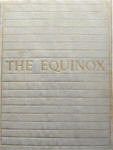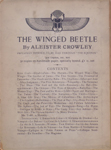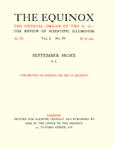100th
MP

|
THE
100th
MONKEY
PRESS |
|
|
|
Limited Editions by Aleister Crowley & Victor B. Neuburg |
|
Bibliographies |
|
Download Texts
»
Aleister
Crowley
WANTED !!NEW!!
|
|
THE EQUINOX VOLUME I, NUMBER IV |
|
Image Thumbnails |
||||||||||||||||||||||||||||||||||||||||||||
|
Title: |
The Equinox (Volume I, Number IV). The Official Organ of the A\A\ |
|
||||||||||||||||||||||||||||||||||||||||||
|
Variations: |
|
|||||||||||||||||||||||||||||||||||||||||||
|
Publisher: |
Aleister Crowley at the Office of the Equinox.1 124 Victoria Street, S.W.2 |
|||||||||||||||||||||||||||||||||||||||||||
|
Printer: |
|
|||||||||||||||||||||||||||||||||||||||||||
|
Published At: |
London.1 |
|||||||||||||||||||||||||||||||||||||||||||
|
Date: |
September 1910.1 |
|||||||||||||||||||||||||||||||||||||||||||
|
Edition: |
1st Edition. |
|||||||||||||||||||||||||||||||||||||||||||
|
Pages: |
xv + 352 + viii + 113 (Supplement) + vii (Advertisements).2 |
|||||||||||||||||||||||||||||||||||||||||||
|
Price: |
Priced at 1 guinea6 for the subscriber‘s edition and 5 shillings2 for the regular edition. |
|||||||||||||||||||||||||||||||||||||||||||
|
Remarks: |
The title page is printed in black and red.2 Some of the “deluxe edition” subscription copies have a color frontispiece of the Equinox “coat of arms” design which is not present in the standard editions.4 |
|||||||||||||||||||||||||||||||||||||||||||
|
Pagination:2 |
|
|||||||||||||||||||||||||||||||||||||||||||
|
Contents: |
- Editorial - Liber III - Liber A - I. Nsit N. Aturae R. Egina I. Sis - Reviews - My Lady Of The Breeches - Reviews - At Bordj-An-Nus - Λινοσ Ισιδοσ - The Temple Of Solomon The King IV - Pan To Artemis - The Interpreter - The Daughter Of The Horseleech - The Dreamer - Mr Todd. A Morality - The Gnome - Reviews - The Herb Dangerous. Part IV: The Hasheesh Eater - The Buddhist - The Agnostic - The Mantra-Yogi - The Violinist - EHE! - Half-Hours With Famous Mahatmas. No 1. - The Thief-Taker - Review - The Eyes Of St. Ljubov - Midsummer Eve - The Poetical Memory - Adela - The Three Worms - The Felon Flower - The Big Stick - Glazier’s Houses - In The Temple - The High History Of Sir Palamedes The Saracen Knight And His Following Of The Questing Beast (Special Supplement)
Illustrations -Aratrum Securum (Facing Page 11) -The Yogi (Facing Page 90) -The Tattwas (Facing Page 108) -Adonai Ha Aretz (Facing Page 114) -The Interpreter (Facing Page 199) |
|||||||||||||||||||||||||||||||||||||||||||
|
Author’s Working Versions: |
|
|||||||||||||||||||||||||||||||||||||||||||
|
Other Known Editions: |
||||||||||||||||||||||||||||||||||||||||||||
|
Bibliographic Sources: |
|
|||||||||||||||||||||||||||||||||||||||||||
|
Comments by Aleister Crowley: |
“The Equinox” should have been, on its merits, a very successful venture. Frank Harris had generously given me one of the best stories he ever wrote, “The Magic Glasses”. Fuller had contributed a gargantuan preface to The Temple of Solomon the King (the title of the story of my magical career), a series of sublimely eloquent rhapsodies descriptive of the various possible attitudes towards existence. There were three important instructions in Magick; the best poem of its kind that I had so far written, “The Wizard Way”; “At the Fork of the Roads”, a true and fascinating story of one of my early magical experiences; The Soldier and the Hunchback ! and ? which I still think one of the subtlest analyses that has ever been written on ontology, with its conclusion: that ecstatic affirmation and sceptical negation are neither of them valid in themselves but are alternate terms in an infinite series, a progression which is in itself a sublime and delightful path to pursue. Disappointment arises from the fear that every joy is transient. If we accept it as such and delight to destroy our own ideals in the faith that the very act of destruction will encourage us to rebuild a nobler and loftier temple from the debris of the old, each phase of our progress will be increasingly pleasant. “pi alpha mu phi alpha gamma epsilon pi alpha gamma gamma epsilon nu epsilon tau omega rho”, “All devouerer, all begetter”, is the praise of Pan. — The Confessions of Aleister Crowley. New York, NY. Hill and Wang, 1969. Page 603. ______________________________
The supplement to the first number of The Equinox is a plain reprint of my Magical Record in Paris, mentioned above. I have omitted no detail of my doings. My dinners, my dalliance and my other diversions are described as minutely as my Magick, my mantras and my meditations. Nothing of the sort had ever been published before. It is a complete demonstration of the possibility of achieving the most colossal results in conditions which had hitherto been considered an absolute bar to carrying on even elementary work. It proves my proposition that the efficacy of traditional practices is independent of dogmatic and ethical considerations; and, moreover, that my sceptical formulae based on a purely agnostic viewpoint, and on the facts of physiology and psychology, as understood by modern materialists, were entirely efficacious. In summary, let me add that The Equinox was the first serious attempt to put before the public the facts of occult science, so-called, since Blavatsky’s unscholarly hotch-poch of fact and fable, Isis Unveiled. It was the first attempt in history to treat the subject with scholarship and from the standpoint of science. No previous book of its kind can compare with it for the perfection of its poetry and prose; the dignity and sublimity of its style, and the rigidity of its rule never to make any statement which could not be proved as precisely as the mathematician exacts. I confess to being entirely proud of having inaugurated an epoch. From the moment of its appearance, it imposed its standards of sincerity, scholarship, scientific seriousness and aristocracy of all kinds, from the excellence of its English to the perfection of its printing, upon everyone with ambition to enter this field of literature. It did not command a large public, but its influence has been enormous. It is recognized as the standard publication of its kind, as encyclopedia without “equal, son, or companion”. It has been quoted, copied and imitated everywhere. Innumerable cults have been founded by charlatans on its information. Its influence has changed the whole current of thought of students all over the world. Its inveterate enemies are not only unable to ignore it, but submit themselves to its sovereignty. It was thus entirely successful from my personal point of view. I had put a pearl of great price in a shop window, whose other exhibits were pasted diamonds and bits of coloured glass for the most part, and at best, precious stones of the cheaper and commoner kind. From the moment of its appearance, everyone had to admit — for the most part with hatred and envy in their hearts — that the sun had appeared in the slum and put to shame the dips and kerosene lamps which had lighted it till then. It was no longer possible to carry on hole-in-the-corner charlatanism as heretofore. I printed only one thousand and fifty copies, the odd fifty being bound subscription copies at a guinea, and the rest in boards at five shillings. Had I sold a complete edition straight out without any discounts my return would thus have been three hundred pounds. The cost of production was nearer four hundred. Similar figures apply to the other nine numbers. In this way I satisfied myself that no one could reproach me with trying to make money out of Magick. As a matter of fact, it went utterly against the grain to take money at all. When anyone showed interest in my poetry or my magical writings, the attitude so delighted me that I felt it utterly shameful to have any kind of commercial transaction with so noble an individual, and I used, as often as not, to beg him to accept the book as a present. — The Confessions of Aleister Crowley. New York, NY. Hill and Wang, 1969. Pages 604-605. ______________________________
To return to The Equinox, there was no question of selling even that small edition even at that pitiful price. I have never had any idea of how to do business. I can make plans, both sound and brilliant; but I cannot force myself to take the necessary steps to put them into practice. My greatest weakness is that as soon as I am sure that I can attain any given object, from climbing a mountain to exploiting a beauty spot, I lose interest. The only things I complete are those of which (as for instance, poetry and Magick) I am not the real author but an instrument impelled by a mysterious power which sweeps me away in effortless enthusiasm which leaves no room for my laziness, cynicism and similar inhibiting qualities to interfere. I did try to get a few booksellers to stock The Equinox but found myself immediately up against a blank wall of what I must call Chinese conventionality. I remember hearing of an engineer in the East who wanted to built himself a house and employed a Chinese contractor. He pointed out that the work would be much easier by using bricks of a different size to that which the man was making. He obeyed, but a day later went back to the old kind. The engineer protested, but the man explained that his bricks were of a “heaven-sent” size. So I found that the format of The Equinox shocked the bookseller; worse still, it was not a book, being issued periodically, nor a magazine, being to big and well produced! I said, “What does it matter? All I ask you to do is to show it and sell it.” Quite useless. - The Confessions of Aleister Crowley. New York, NY. Hill and Wang, 1969. Pages 605-606. |
|||||||||||||||||||||||||||||||||||||||||||
|
Reviews: |
This Gargantuan volume contains such a variety of matter that it is only possible to give the merest sketch of its contents in a short notice. There is a long continuation of “The Temple of Solomon the King,” which, like a stately vessel, winged with pearl and amethyst, is borne majestically upon the ocean of its profound philosophy. George Raffalovich has a story of elusive subtlety. In “Mr. Todd, A Morality,” there is a symbolism curiously blended of the sinister and the pathetic, as well as shrewd insight into human nature. The Editor and his staff of reviewers sport like young goats among ordered pastures of indifferently and well bound volumes. While some are left standing or held aloft for admiration, others are not only knocked down, but even trampled upon and savagely bitten. The review of “The White Slave Traffic” is excellent for its bold rebuke of hypocrisy and its healthy outlook upon the whole subject, and Captain Fuller has a long and favourable critique of Albert Churchward’s “The Signs and Symbols of Primordial Man” which should be read by all lovers of light. Indeed, the notices of books in this number are as characteristic as ever, and when they do not illuminate, they make us laugh or smile, which is no bad thing. “Glaziers’ Houses: or, The Shaving of the Shagpat,” is designed as a kind of defence of Bernard Shaw. He who wishes to chase the esoteric can do so in two poems by Victor B. Neuburg, who admirably limns the lurching gait and monstrous form of a gnome in the very construction of the lines of his first contribution. Aleister Crowley’s poem “Adela” has that expression of beauty, that signal power and that fierce desire which we can now at once recognize. “The Violinist” appears to have been written to accompany a series of drawings which Aubrey Beardsley did not live to execute; at least, I am sure that this artist would have hastened to ask to be allowed to illustrate the story. Among the many poems, “The Felon Flower,” by Ethel Archer, is remarkable for a fine diabolism. But the wonder of the whole book is the noble and beautiful poem, “The High History of Good Sir Palamedes the Saracen Knight and of his Following of the Questing Beast. By Aleister Crowley rightly set forth in rime.” —The Occult Review, November 1910. ______________________________
The new number of “The Equinox” continues to keep up the tradition of the earlier numbers as to size, the mystical nature of its contents, and the unintelligibility of many of its articles. . . . —Review of Reviews, date unknown. ______________________________
Here is the weirdest muddle that one could well stumble across in this most muddled age. . . . Powerfully individualistic, descending sometimes nearly to the level of the sordid, soaring sometimes to the heights of genius, the matter could not be reviewed properly in twenty times the space that we can give it. . . . Those who are certain of their sanity and the breadth of their viewpoint should read this magazine when they get the opportunity. Theosophists will find the few references to Theosophy anything but complimentary. . . . —Theosophy in Scotland, date unknown. ______________________________
The
Equinox is permanent in its stately size and type, continuous in
its periodical character, permanent—in the value of its
contents. ______________________________
Expensively printed lunacy, astrology, etc., in oriental-occidental jargon. —The Literary Guide, date unknown. ______________________________
It easily takes rank as the most vigorous swearer and blasphemous in respectable modern literature. Moreover its swearing and blasphemy are splendidly done, with immense style and glorious colouring. Its contributors certainly know how to write, though occasionally they remind one of certain efforts that have emanated from lunatic asylums where gorgeousness of imagination and riotous language are by no means unknown. But underneath all, there is a huge wealth of knowledge, a few indications of serious feeling, and a big flow of occult thought. Yet with all its “illuminism” it is so much of a mocker that we have before us the figure of a Mephistopheles. . . . The Equinox is put forth with a certain pomp, its writers are by no means negligible in competence. All we can say is that they remind us of Diakkas and Jingles, and occasionally of Colney Hatch. . . . The reference to black mass and the chaotic mixture may possibly help to explain the rumours of devil worship which were persistent not long ago. Perhaps we have here the key to that dark door. . . . —The Light, date unknown. ______________________________
A mysterious publication called “The Equinox,” the official organ of the A\ A\ has just been released upon a long-suffering world. . . . It is a sort of thing no fellow can understand. One gathers vaguely out of the confusion that it deals with such things as Magic, wizardry, mysticism, and so on; but what the special line is, remains a baffling mystery. . . . From frequent references to some people called The Brothers of the A\ A\ one gathers that they have a lot to do with this weird venture; but a grim perusal of an article purporting to explain the Order . . . leaves one without any real clue as to their identity. True, the Chief of the Brothers is definitely names, his name being “V.V.V.V.V.” but five V’s, do not strike one as a name likely to be well known at any local post office. . . . One gets all kinds of entertainments in “The Equinox” . . . Poetry gets a strong show, but it is uncomfortable reading. . . . A\ A\ —The Morning Leader, date unknown. |
|||||||||||||||||||||||||||||||||||||||||||





